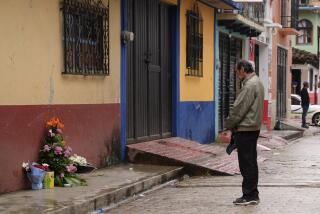Nicaraguan clergy face threats after providing refuge for protesters fleeing gunfire: ‘The church became a type of morgue’
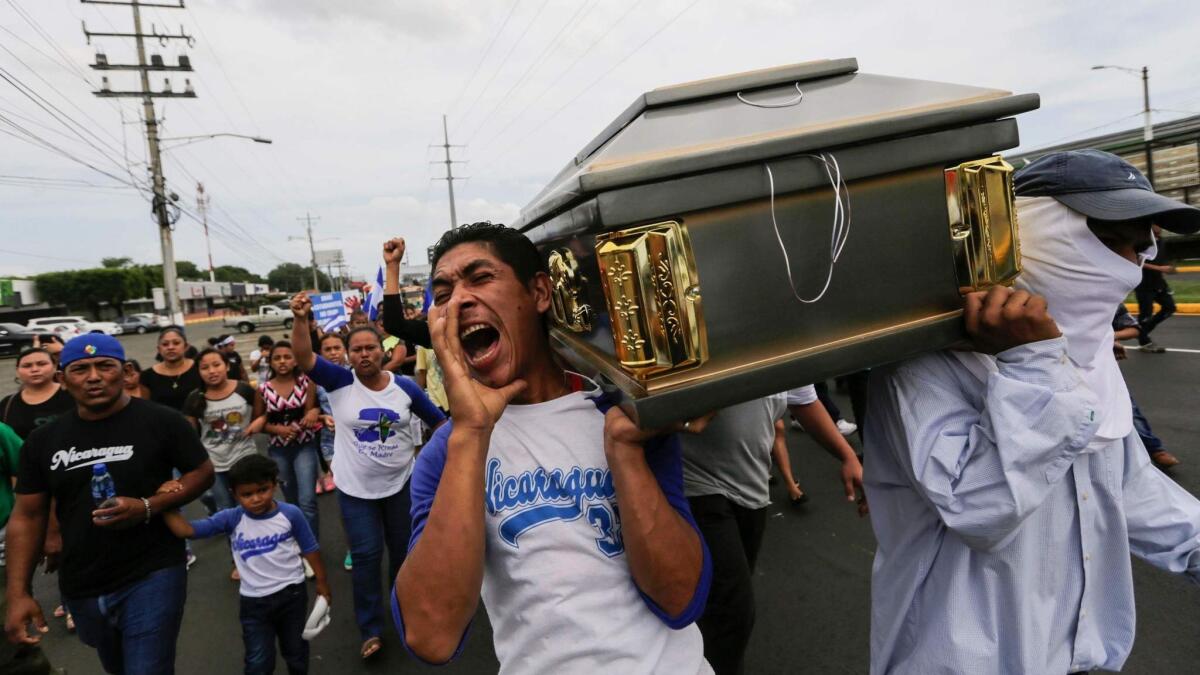
For months, Father José Alberto Idiáquez has received threats on Twitter, on WhatsApp and in phone calls. The aggressors say that the Jesuit university he runs in Nicaragua’s capital supports a coup against the government and that he has been inciting his students to protest.
On any given day, dozens — and sometimes hundreds — of armed police and paramilitary surround Universidad Centroamericana in Managua. They have been deployed to intimidate him and others, said Idiáquez.
Idiáquez has loudly condemned longtime President Daniel Ortega’s violent crackdown against a civil uprising that began last April and has led to more than 300 deaths and 2,000 injuries, according to the Inter-American Commission on Human Rights, mostly at the hands of national police and paramilitary gunmen. Many of Idiáquez’s students are opposition activists, and he has participated in marches himself and offered the campus as shelter for those fleeing gunfire.
“When you see them killing people, you have an obligation to protect someone who is defenseless,” he said in a phone interview.
As a result, he is now a target himself.
Since the protests began, the Roman Catholic Church and individual clergy in the Central American nation of 6 million have condemned excessive government force, and have sheltered demonstrators and mediated attempts at dialogue. Consequently, some have suffered physical attacks and have either fled the country or faced threats or defamation campaigns.
While the initial demonstrations were sparked by changes to the social security system that would increase taxes, they quickly escalated into demands for Ortega’s resignation and for broad-brush political reforms. In reaction, the government forcefully quelled dissent and outlawed public protests. Over 600 people, considered political prisoners by the opposition, are currently in detention, according to the IACHR.
Ortega has said that opposition human rights groups have reported an inflated number of deaths. And in a July interview with Fox News, Ortega blamed the violence on paramilitary groups organized by people who are opposed to the government. He denied any persecution of priests, saying, “There’s not a single priest who can claim that he’s been attacked by the government.”
Violence has ebbed since the summer but arrests continue. On March 20, the government agreed to release all those who have been imprisoned within 90 days as a precondition for renewed negotiations with the Civic Alliance, a coalition that represents the opposition.
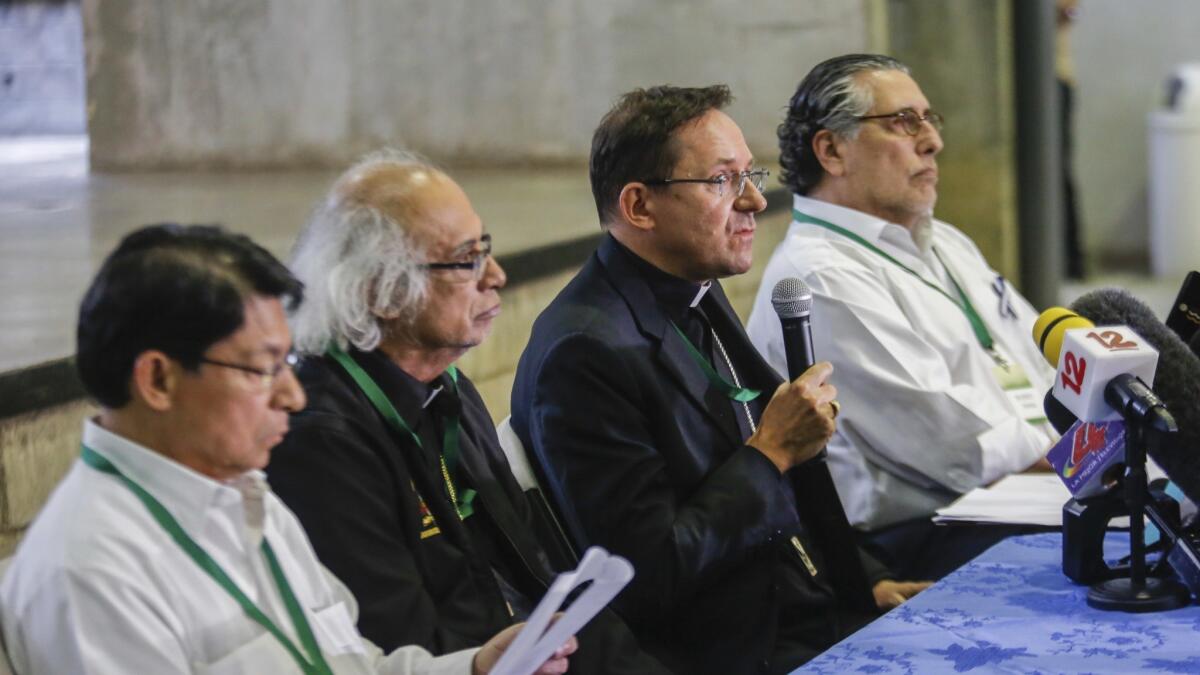
In a predominantly Roman Catholic country, many view the church as the only legitimate institution remaining that can intervene with the Ortega administration as it has suppressed political parties, jailed journalists and forced human rights groups into exile.
While the church in March declined an invitation to join political negotiations, priests have continued to speak up and have faced a backlash. Bishop Abelardo Mata, the general secretary for the Roman Catholic Conference of Bishops in Nicaragua, said that bishops have suffered denigration and slander by government supporters.
“There has been a strong moral attack against the bishops and priests that have distinguished themselves for defending human rights — accusing us of attempting a coup when our goal is to ask the president to respect the conditions of the dialogue,” said the bishop, who last July was shot at by paramilitaries while traveling in a car, according to local news reports.
The church’s leadership has historically alternated between supporting and opposing the leftist Sandinista government, which came to power in a 1979 uprising that toppled Nicaragua’s U.S.-backed dictator Anastasio Somoza.
In 2005, Cardinal Miguel Obando y Bravo, a prominent critic of the Sandinista government following the revolution, officiated the marriage of Ortega and his wife (the country’s vice president). This reconciliation played an important role in Ortega’s reelection the next year following 16 years out of office, said Karen Kampwirth, a Latin America expert at Knox College. Ortega also backed an abortion ban to win support from the church before the election.
In 2014, the national assembly voted to scrap presidential term limits. That year, the church’s Conference of Bishops sent a letter to Ortega, criticizing his government for violating indigenous peoples’ rights, stifling freedom of expression and using force against protesters.
“They have utilized religious language and have tried to infiltrate the parishes on the pretext that they are loving people,” said Mata. “They gave money to support the festivals for patron saints, but their goal was another one — trying to gain supporters in the church for the regime.”
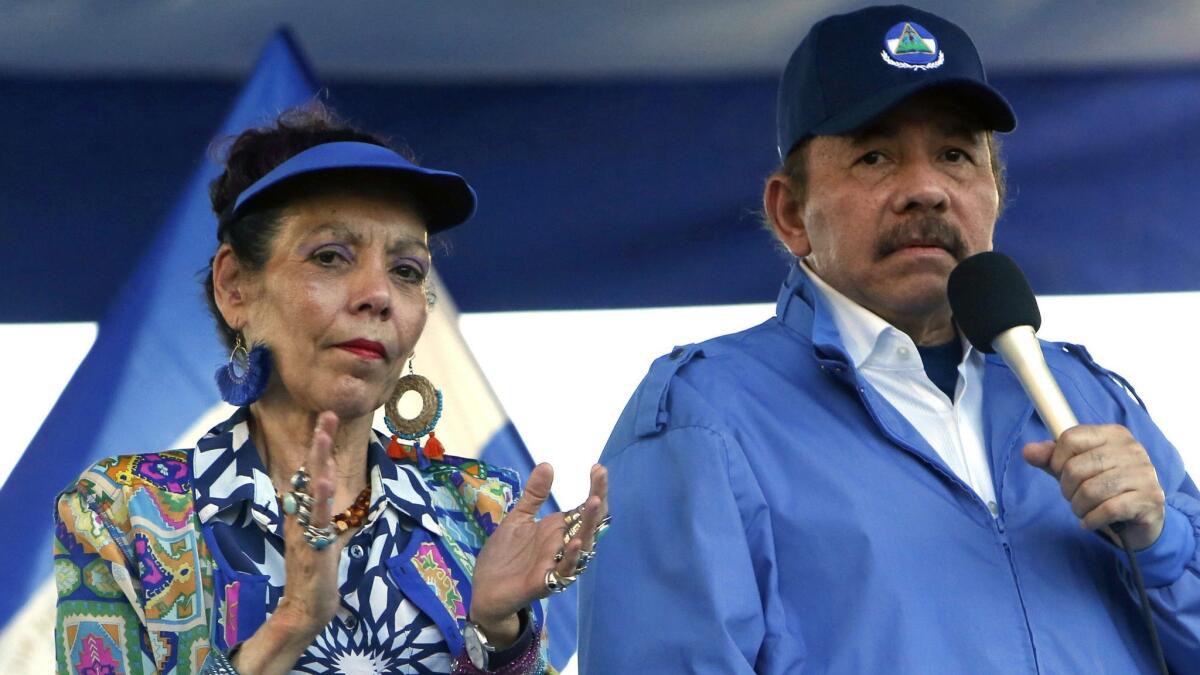
When the violence broke out last April, the church condemned the government and pushed to mediate talks with the opposition. In a July letter, the Conference of Bishops said the government lacked political will for sincere dialogue, writing that the church’s pastoral mission “does not contradict our role as mediators and witnesses since we search for peace and justice like [all] Nicaraguans.”
Cardinal Leopoldo Brenes, the archbishop of Managua, denied accusations that the church has backed a coup and Ortega’s assertion that some churches have housed armed protesters.
“The crisis was so abrupt, unexpected, violent that it put the bishops in a much more delicate situation,” said Felix Maradiaga, an academic and opposition activist living in exile. “The absence of opposition political parties obligated the church to step to the front to fill that vacuum by being the force that told the government to end the human rights violations.”
When student-led protests began on April 18, Idiáquez’s Jesuit university was one of the first attacked. Sandinista youth arrived on buses and destroyed the school’s main entrance with sticks and stones, Idiáquez said. On May 30, Idiaquez opened the school up to thousands when pro-government forces repressed a march in support of mothers of victims.
Ortega’s government, he said, has reduced its funding for students who receive financial scholarships — a loss of $2.5 million — and has refused to let imported products for the school through customs.
“They punish us from every side,” he said.
Evangelical pastors have denounced repression and faced intimidation as well. Tanya Mroczek-Amador started a mission in 2000 in a rural area of Matagalpa, where she worked with about 100 churches. After church leaders participated in marches, she said, they faced threats from Sandinista supporters and had their wells poisoned or their animals stolen or slaughtered.
“All of a sudden, the evangelical churches went completely quiet,” she said, adding that now, most pastors from that area are in hiding.
While the Catholic Church strongly opposes abortion, that has not deterred its legitimacy as a mediator in the eyes of many human rights activists, including those within Nicaragua’s women’s movement who fiercely criticized the abortion stand, said Manuel Orozco, a Central America expert at the D.C.-based Inter-American Dialogue think tank.
“You are simply entering in a battle that is far bigger, that is, the future of the country in terms of democracy institutions,” he said.
Violeta Granera, a prominent opposition activist, agreed.
“They have risked their lives to be on the side of the Nicaraguans,” she said. “That has given it recognition that goes beyond differences between the church’s positions and some sectors.”
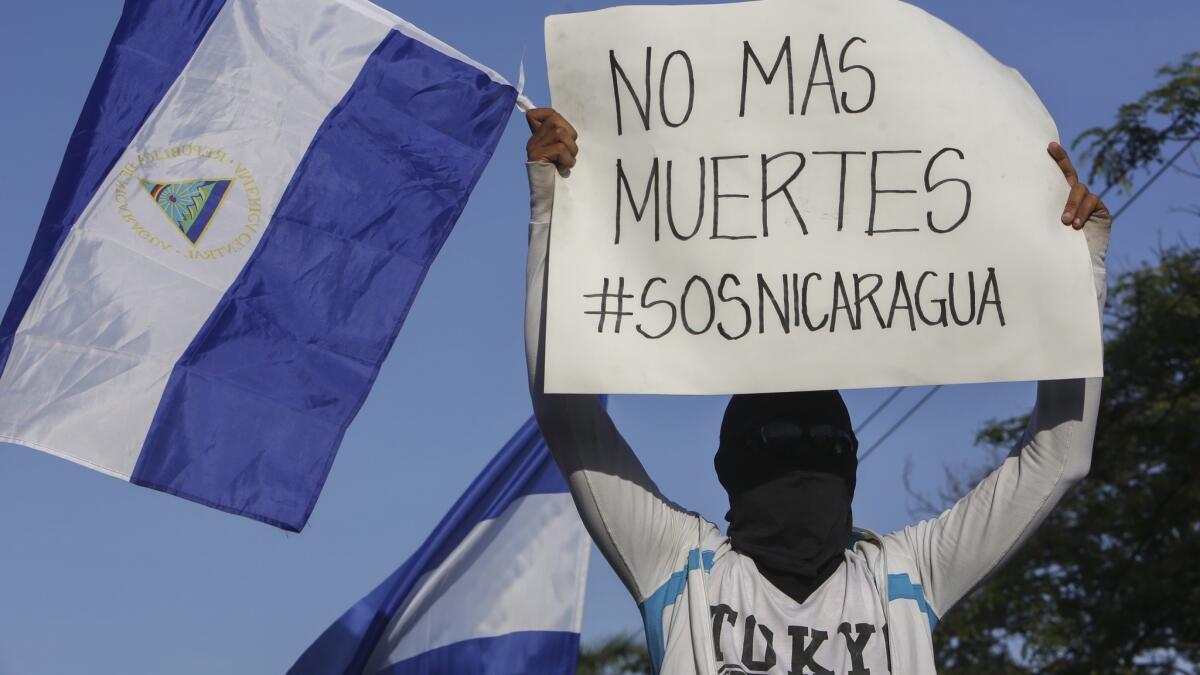
The Organization of American States and the Vatican both helped facilitate the agreement to release political prisoners. Many who experienced the violence firsthand, like Father Edwin Román Calderón — a priest at the church of San Miguel in Masaya — hope that this type of international pressure will push talks forward.
For several months last summer, Calderón turned his rectory into a medical refuge. He says he often woke up to the sound of gunshots and rushed outside to carry wounded protesters to his church. Those taken to the church included some who were injured and others who were dead.
“The church became a type of morgue.” Calderón said.
Doctors and medical student volunteers slept on the floor and Calderón often went days without sleeping or showering. The church also turned into a place for mothers to report their children’s disappearances.
“It had a tremendous impact on me,” he said. “Especially when they entered the rectory bleeding and I saw the streams of blood. … There is no reason for the blood of youth to be running on the floor.”
Calderón still receives threats for his activism. His church services have been disrupted by government supporters and in February, he said, agents of the national police stopped his car and physically harassed him. In a news release, authorities said he was stopped because he was zigzagging while driving and was intoxicated, an accusation the priest denies.
Calderón says he will not be intimidated.
“On the contrary,” he said, “it has filled me with more courage and more obligation to the people. … I don’t consider myself only a priest for Mass. Rather, I am immersed in a reality.”
More to Read
Sign up for Essential California
The most important California stories and recommendations in your inbox every morning.
You may occasionally receive promotional content from the Los Angeles Times.


